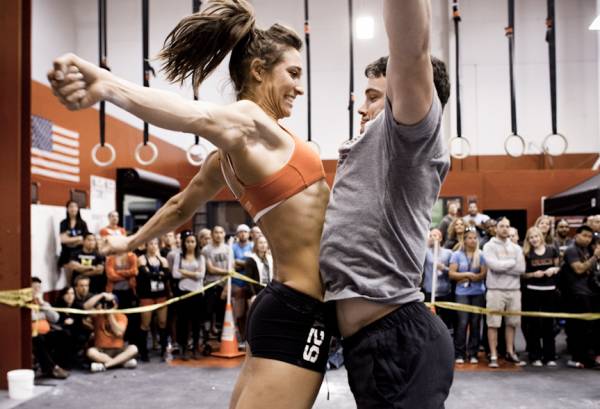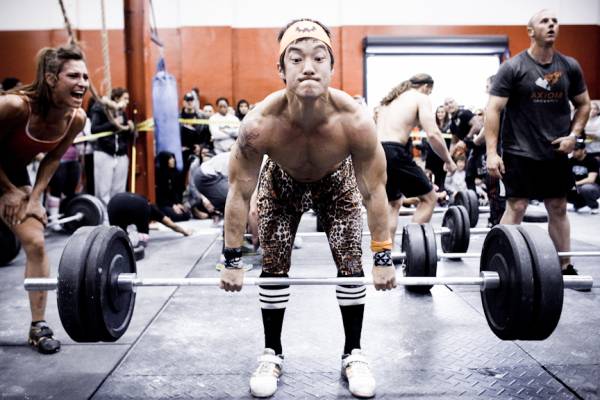In sport psychology circles around forty years ago, there was a lot of talk about arousal levels and how they affect athletes of every level and every sport. Over the years I have done my own exploration, and this is what I have determined about when and how to get yourself wound up.
Me, after winding myself up for this lift.
Mental Training Is Not Just for Lifting
Robert M. Nideffer said, in An Athletes’ Guide to Mental Training:
Optimal performance and total concentration can only occur when your level of physical arousal matches the demands of the competitive situation. For each of us, there is a very fine line between being too aroused and not being aroused enough. Because controlling arousal is such an important part of your mental training, you need to fully understand what is meant by this concept.
While several of the sport psychology books mention weightlifting, most are primarily focused on other sports like baseball and tennis. For me, exerting my strength is my game. But I do it in many different ways – from weightlifting to gymnastics, strongman to kettlebells, and more. Each of these can have different approaches to them when it comes to your psychology.
Optimal Arousal Level Depends on the Task
Early on in my training, I would watch videos of weightlifters screaming and, in my mind at least, acting a fool. They even had other people slap them to help them psych up. I thought it was silly, so I didn’t try it. I took more of a Zen approach to my training.
But as I continued to train, and to more deeply explore my capabilities, I realized there was a lot more to this idea of psyching up. Sometimes you do want to be heavily psyched up. The gross motor movements like squats and deadlifts are good examples of movements that benefit from high arousal, and partial variations of these movements benefit even more so.
“[Y]our optimal arousal level depends on what you’re doing. Thus psyching up can be useful if you use it at the right time for the right things.”
Conversely, when working on skilled movements, you want to be relaxed and concentrated. Psyching up to do a handstand is likely to hurt your balance, not help it. Psyching up for an endurance event is going to get you tired more quickly than normal.
So, your optimal arousal level depends on what you’re doing. Thus psyching up can be useful if you use it at the right time for the right things. Higher strength activities, versus endurance endeavors, are a good opportunity for psyching up. More gross motor movements, versus skill-based movements, are another place to look for where psyching up can help.

Learning and Practicing the “Psych-Up State”
Here is what experts Dr. Thomas Tutko and Umberto Tosi wrote in their book, aptly named Sports Psyching:
Although you can’t be hot 100 percent of the time, you can play at your best consistently – much more often than you probably are now. You can do so by learning a deliberate, conscious method that supplies a set of psychological tools you can call upon in your game.
Using my background in NLP (neuro-linguistic programming) I looked at a number of different methods to help optimize this “psych-up state” from the external to internal, using the body and the mind. The modeling methods in this system allowed me to find what worked and make it reproducible and transferable.
- Music is a commonly used tool for psyching up.
- Visualization, in many forms, can be another.
- Anchors, set by how you approach an exercise, are often used though unconsciously for most.
The more you consciously work on psyching in a way that works for you, the better you can control it. The better you control it, the more benefit you’ll get from doing it. As a result, you’ll be able to maintain a certain useful arousal level throughout a workout and be able to peak it at the right times. People naturally do this to some degree, but if you practice psyching up as a skill you can become even better at it.
RELATED: Arousal Management: The Science Behind Getting Mad at the Bar
Breathing and State Management for Competition
There is another simple, yet hugely effective part of psyching – breath work. Psyching up causes a few physiological actions in the body. Increases in heart rate, blood pressure, and muscular tension are typical.
So consider: what are ways you can bring about these changes by using your breath? Holding your breath is one of them. Breathing fast, even hyperventilating, is another. Thus, you can use these to help you psych up. And the opposite is also true. When you need to psych down, or relax, you just do the opposite. Slow your breath down. Emphasize a longer exhale through the mouth. Being able to amp up and then ramp down on command is a valuable skill for any athlete in any sport.
Just recently I competed in a strongman competition. If you aren’t familiar with these or similar competitions, they typically involve a lot of waiting around. And then, when it’s finally your turn to do an event, there’s about one minute of crazy activity. This happens for five events spread over about six hours.
“Being able to amp up and then ramp down on command is a valuable skill for any athlete in any sport.”
If you stayed psyched up for the entire competition, you would burn yourself out. Or if you psych up too early, like during warm up, the same burnout would likely occur. But if you’re not psyched up when its time to go, then you won’t perform well.

Basically, for optimal performance you need to get to the right state of arousal level (the right amount of psych-up) at the snap of your fingers before you start an event. Once you’re done, then its your job to get back to a base level of arousal, where you can relax.
You could be the strongest person at the event, but if you can’t do this psych up and down, then you cannot perform optimally – and you might lose. Competition is state management at its best.
RELATED: Sports Psychology Warning: Do NOT “Psych Up” ‘Til You Read This
Take Home
You don’t need to be a competitor to benefit from managing your arousal level. I used these same skills in different ways to lift over 1,000lbs and to drop into the front splits.
All strength and fitness has, at its base, state management. Psyching up is just one form. When you use it properly, it can immediately increase your performance in many activities. You’re going to go through states no matter what, so it’s up to you if you want control over them or if you’d like them to control you.
References:
1. Nideffer, R., Athletes’ Guide to Mental Training Human Kinetic Books. Illinois, pg 18
2. Tutko, T. et al., Sports Psyching. Penguin. New York, pg. 106-107
Photos courtesy of Michael Brown.






